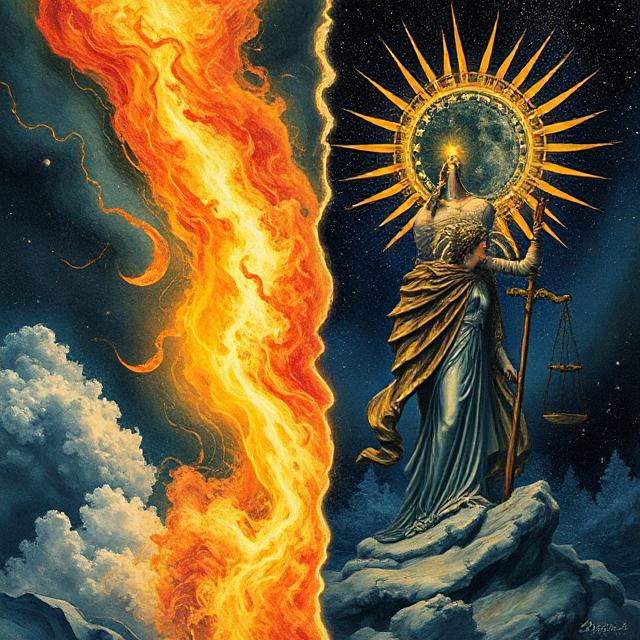Your cart is currently empty!
Karma vs Divine Justice: Who Deserves What and Why?

Table of Contents
Karma vs Divine Justice—Two Paths, One Question
Karma vs Divine Justice is more than a philosophical puzzle—it’s a lens into how civilizations structure morality, accountability, and the very mechanics of destiny. Do people suffer because of their own actions from past lives (karma), or is justice handed down by a personal God according to divine law?
Whether you’re exploring this question from a Hindu, Buddhist, Christian, Islamic, or philosophical perspective, it challenges assumptions about responsibility, fairness, suffering, and grace.
I. What Is Karma?
The concept of karma (from the Sanskrit “kri” = to do) refers to action and its consequences. It is not just punishment or reward—it’s the metaphysical law of cause and effect applied to moral behavior.
Core ideas of karma:
- Causal Continuity: Good or bad actions in this life or past lives influence future experiences.
- Rebirth: Karma is often tied to samsara, the cycle of death and rebirth.
- Personal Responsibility: Every being is the architect of their own fate.
In Hinduism and Jainism, karma plays a mechanical, self-operating role. In Buddhism, while karma is real, it’s not eternal punishment—karma can be neutralized through awareness and enlightenment.
Karma provides a rational explanation for suffering without a divine judge.
II. What Is Divine Justice?
Divine justice is rooted in Abrahamic theologies, especially Judaism, Christianity, and Islam. It refers to a personal, omnipotent God who ensures that justice is ultimately served—even if not in this life.
Core ideas of divine justice:
- Moral Order: The universe is governed by God’s will and moral law.
- Judgment Day: Final justice is dispensed in the afterlife.
- Grace and Mercy: Punishment isn’t purely merit-based; forgiveness is possible.
- Purposeful Suffering: Trials may have a divine purpose or test.
While karma distributes consequences impersonally, divine justice includes intention, mercy, and sometimes grace—a break in the chain of strict causality.
III. Karma vs Divine Justice: A Comparative Table
| Aspect | Karma | Divine Justice |
|---|---|---|
| Source of Morality | Action-based cause and effect | God’s will and commandments |
| Judgment Agent | Impersonal cosmic law | Personal deity |
| Scope | Continuous across lifetimes | Final judgment in eternal afterlife |
| Role of Mercy | Minimal or none | Central; forgiveness through repentance |
| Suffering Meaning | Result of past actions (personal responsibility) | Test, punishment, or grace |
IV. Philosophical Dilemmas Raised
1. Is Perfect Justice Possible?
If karma operates mechanically, how can it consider context, intent, or growth? If divine justice is personal, how can it avoid arbitrariness or favoritism?
2. Problem of Evil
- Karma: Suffering is earned—even if the reason is hidden.
- Divine Justice: Suffering may be undeserved but serves a divine purpose.
3. Moral Motivation
- Karma encourages moral behavior out of self-interest.
- Divine justice invokes fear of Hell but also the hope of Heaven and God’s love.
V. Overlapping Themes
Despite the differences, Karma and Divine Justice share ethical frameworks:
- Accountability: Actions matter.
- Transformation: Future outcomes can change through moral correction.
- Hope: Justice is real—even if delayed.
Mystics from both camps often merge the ideas:
- Sufis believe in divine love that purifies the soul.
- Vedantic thinkers speak of karma burning off in higher states of consciousness.
- Christian saints view trials as purifying fires.
VI. Can These Views Be Reconciled?
1. Karma as Divine Mechanism
Some theistic Hindus and Buddhists believe karma operates under divine will—not outside it.
2. Divine Mercy Modifying Karma
In some esoteric Buddhist or Hindu schools, a guru’s grace or divine intervention can interrupt karmic fate.
3. Theistic Karma
The Baháʼí Faith and some new religious movements see karma and divine justice as two sides of one process: God’s justice operates through moral cause and effect.
VII. Contemporary Applications
In modern psychology and self-help, karma is often rebranded:
- “What goes around comes around”
- “You get what you give”
- “Energy flows where attention goes”
And divine justice often becomes:
- “Everything happens for a reason”
- “God has a plan”
Despite the theological differences, both concepts provide frameworks for enduring hardship, seeking virtue, and believing in a moral arc to the universe.
TL;DR Summary
- Karma is impersonal, cause-effect morality across lifetimes.
- Divine justice is personal, often delayed but includes mercy.
- Both explain suffering, promote ethical living, and shape hope.
- Key difference: Karma is earned; divine justice may be forgiven.
Suggested Books
- Karma by Traleg Kyabgon
- The Problem of Pain by C.S. Lewis
- God and the Between by William Desmond
- The Bhagavad Gita (esp. chapters on karma yoga)
- Divine Justice by Javad Shayegan
Reflection Prompts
- Do you believe justice must always be earned?
- How do you respond to undeserved suffering?
- Which model feels more empowering—karma or grace?
- Can you forgive without needing repayment?
